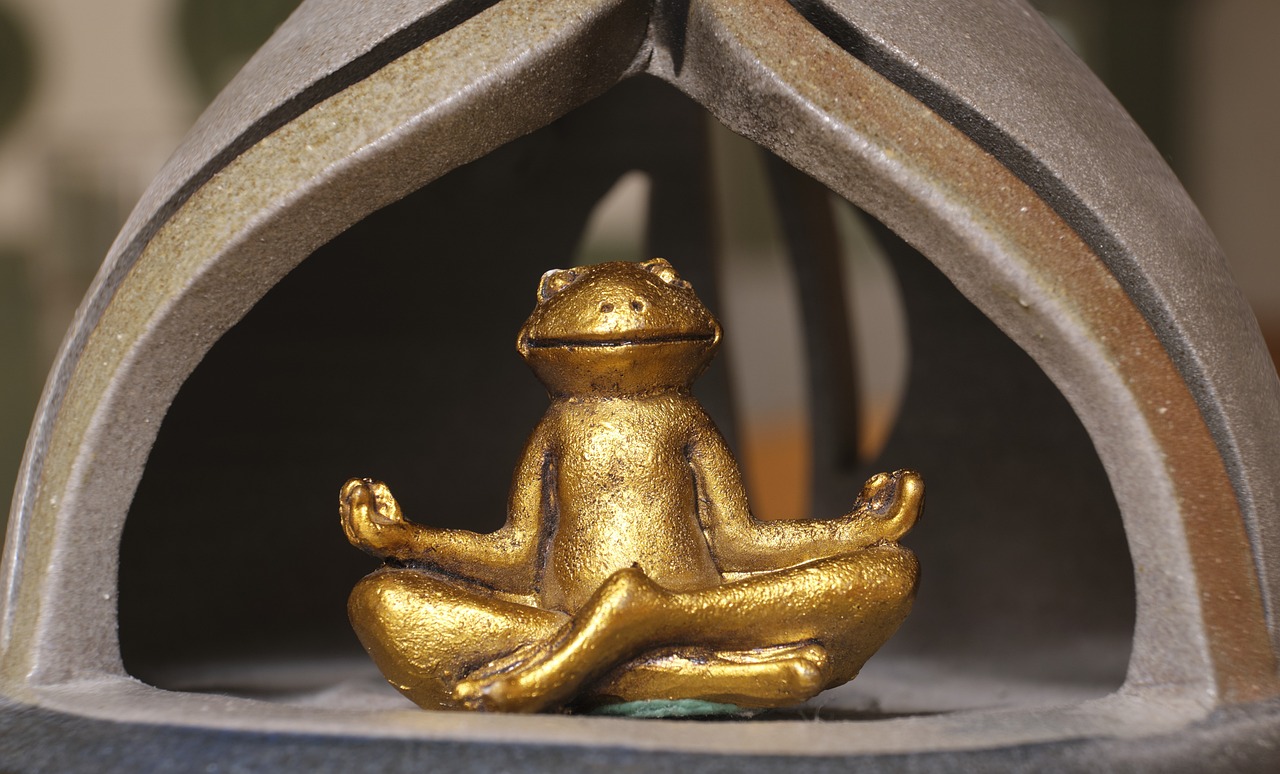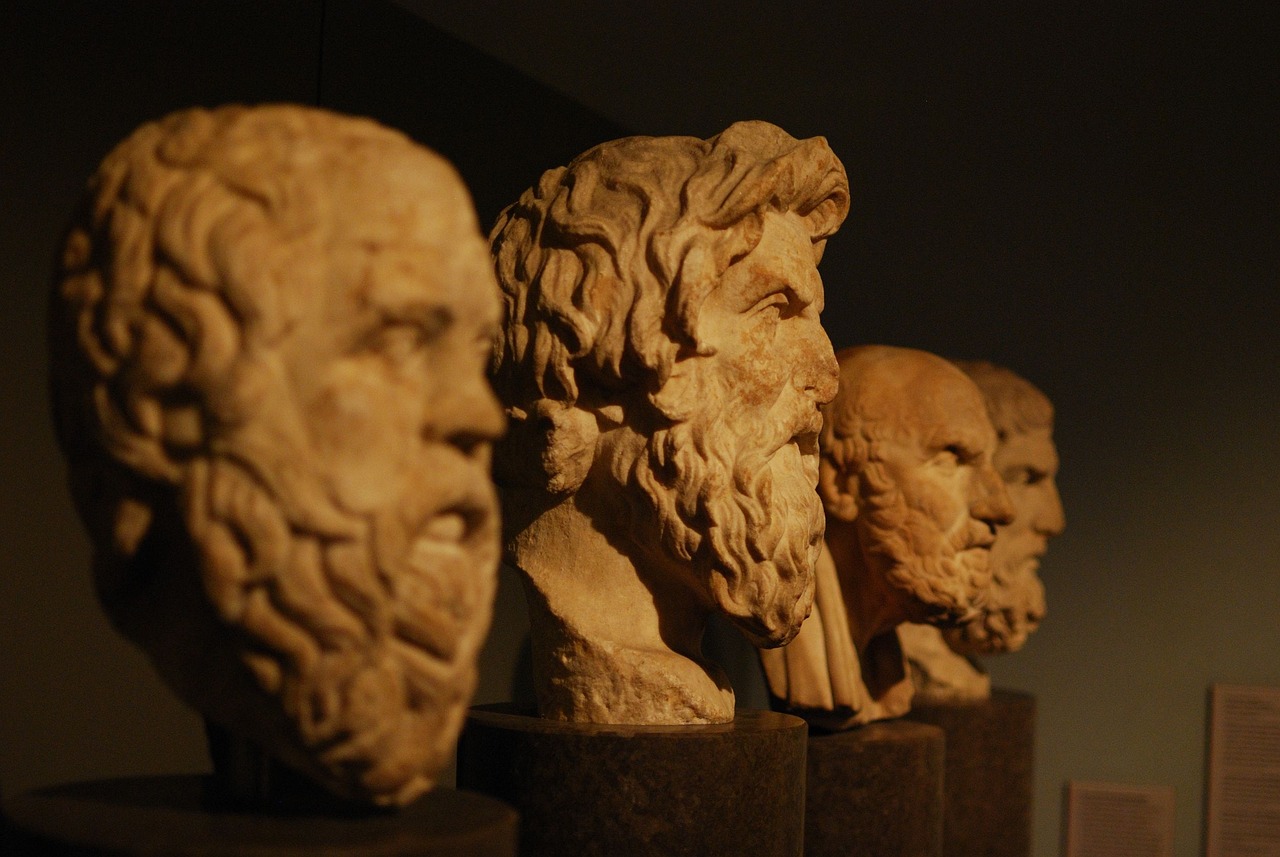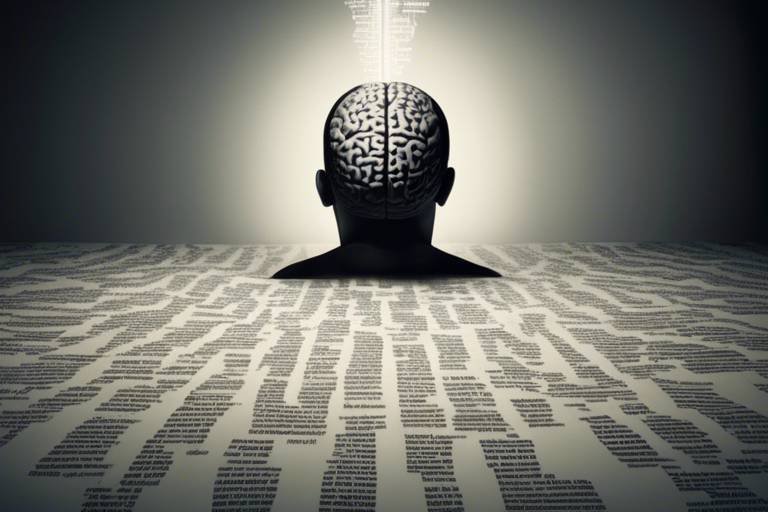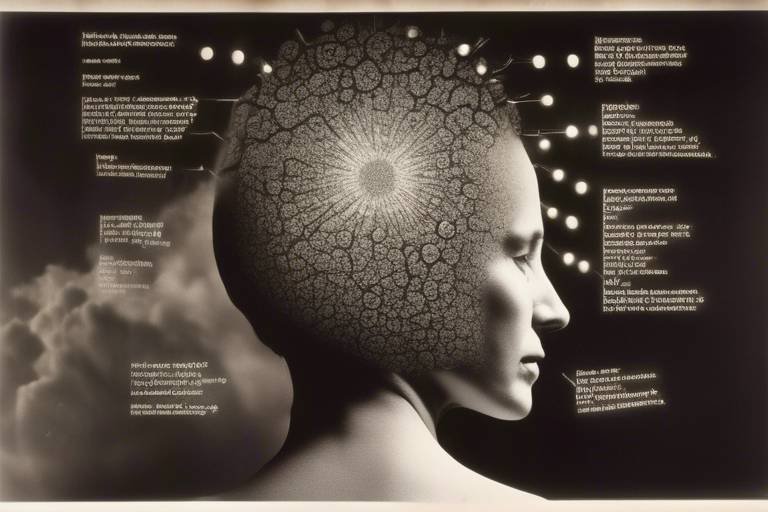Philosophy of Mind - Understanding the Self
The philosophy of mind is a captivating realm that invites us to explore the very essence of what it means to be human. It delves into the intricate relationship between our minds and our sense of self, challenging us to ponder profound questions about consciousness, identity, and existence itself. Have you ever wondered what makes you, you? Or how your thoughts and feelings shape your reality? These questions are not just philosophical musings; they are at the heart of understanding our place in the universe.
As we embark on this journey, we will navigate through various theories and concepts that have emerged over centuries, each offering unique insights into the nature of consciousness. From ancient philosophers to contemporary thinkers, the quest to comprehend the mind has evolved, yet the core inquiries remain strikingly similar. The exploration of the mind is akin to peeling back the layers of an onion—each layer revealing deeper truths about our perceptions, experiences, and ultimately, our identities.
In this article, we will dissect the fundamental aspects of consciousness, the dichotomy of mind and body, and the enigmatic problem of other minds. We will also touch upon the implications of these philosophical discussions on empathy, ethics, and our interactions with others. So, grab a cup of coffee, sit back, and let's dive into the fascinating world of the philosophy of mind!
At the heart of the philosophy of mind lies the concept of consciousness. What is it? How does it influence our understanding of ourselves? Theories about consciousness abound, ranging from the idea that it is a mere byproduct of brain activity to the belief that it is a fundamental aspect of existence. Some philosophers argue that consciousness is what makes us aware of our thoughts and feelings, while others posit that it is the very essence of our being.
Consider this: when you experience a moment of joy, like the laughter shared with a friend, that feeling is not just a chemical reaction in your brain; it is a conscious experience that shapes your identity. This subjective experience is what differentiates us as individuals. As we explore these theories, we will uncover how consciousness intertwines with self-awareness, leading us to a richer understanding of our human experience.
One of the most influential theories in the philosophy of mind is mind-body dualism, which posits that the mind and body are distinct entities. This perspective invites us to consider the implications of separating our mental experiences from our physical existence. What does it mean for our identity if our thoughts and feelings are not tied to our physical bodies?
René Descartes, a pivotal figure in dualism, famously declared, "Cogito, ergo sum" (I think, therefore I am). This assertion laid the groundwork for the belief that the mind is a separate entity from the body. Descartes argued that while our bodies are subject to the physical laws of nature, our minds operate in a realm of thought and consciousness that transcends the material world.
Despite its historical significance, dualism faces considerable critiques. Many argue that advancements in neuroscience challenge the notion of a separate mind, suggesting instead that our mental states are intricately linked to physical processes in the brain. Critics often point out that a more integrated view of mind and body may provide a clearer understanding of our experiences.
Nevertheless, contemporary philosophers continue to defend dualism, presenting modern interpretations that address the critiques. These perspectives often emphasize the unique qualities of consciousness that may not be fully explained by physicalism. As debates continue, the relevance of dualism in understanding our minds remains a vibrant area of discussion.
On the other end of the spectrum, we have physicalism, which argues that everything about the mind can be explained in physical terms. This reductionist approach seeks to unravel the complexities of mental states by linking them directly to brain activity. But does this perspective do justice to the richness of our conscious experiences? Can we truly reduce thoughts, emotions, and identities to mere chemical reactions?
Another intriguing aspect of the philosophy of mind is the problem of other minds. How can we know that other minds exist, and what does that mean for our understanding of self? This question challenges us to consider the nature of empathy and consciousness in our interactions with others. When we communicate, how do we bridge the gap between our subjective experiences and those of others?
Empathy plays a crucial role in our perception of others' minds. It allows us to connect, to share in the joys and sorrows of those around us. Through empathetic engagement, we gain insights into the experiences of others, enriching our understanding of ourselves in the process. It's as if we are all part of a vast tapestry, each thread representing an individual experience that contributes to the whole.
The implications of the problem of other minds extend far beyond mere curiosity; they touch on ethics and social philosophy. Our understanding of other minds influences our moral responsibilities and shapes our interpersonal relationships. If we recognize the consciousness of others, we are compelled to consider their experiences and feelings in our actions.
- What is the philosophy of mind? The philosophy of mind explores the nature of consciousness, identity, and the relationship between the mind and body.
- What is dualism? Dualism is the belief that the mind and body are distinct entities, each with its own characteristics and functions.
- How does empathy relate to the philosophy of mind? Empathy allows us to understand and connect with the experiences of others, enriching our perception of consciousness and identity.

The Nature of Consciousness
Consciousness is one of those mind-boggling concepts that has puzzled philosophers, scientists, and curious minds alike for centuries. What exactly is consciousness? Is it just a byproduct of our brain's complex neural networks, or does it represent something more profound? Think of it as the stage on which our thoughts, feelings, and experiences play out. It’s like being the director of a movie, where every scene is crafted from our perceptions and interactions with the world around us.
At its core, consciousness encompasses our awareness of ourselves and our environment. It's that inner voice that narrates our experiences, the silent observer that witnesses our thoughts and actions. This self-awareness is what sets us apart from other living beings, creating a unique tapestry of subjective experiences. But how do we understand this intricate web of awareness? Various philosophical theories attempt to untangle this mystery, each offering a different lens through which to view consciousness.
One popular theory is the higher-order thought theory, which suggests that consciousness arises when we have thoughts about our thoughts. Imagine you're watching a movie and suddenly realize you're crying during a sad scene; that moment of realization is a higher-order thought that brings you into a conscious awareness of your emotional state. On the other hand, there's the phenomenal consciousness perspective, which emphasizes the qualitative aspects of experiences—the 'what it's like' feeling of being you. For example, the taste of chocolate or the color blue isn't just a sensory input; it’s an experience that fills your consciousness with richness and depth.
Another fascinating aspect is the debate between dualism and physicalism. While dualists argue that the mind and body are separate entities, physicalists believe that consciousness can be fully explained through physical processes in the brain. This ongoing tug-of-war raises essential questions: If consciousness is merely a byproduct of brain activity, can we ever truly understand the essence of self? Or is there something more, a non-physical element that contributes to our conscious experience?
Moreover, the exploration of consciousness isn't just a philosophical endeavor; it has real-world implications. Consider how our understanding of consciousness influences areas like artificial intelligence and neuroscience. As we delve deeper into the workings of the brain, we find ourselves at the crossroads of ethics and technology. For instance, if we create machines that exhibit signs of consciousness, how do we treat them? Are they deserving of rights and moral consideration? This intersection of consciousness, ethics, and technology opens up a Pandora's box of questions that society must grapple with.
In summary, the nature of consciousness is a complex and multi-faceted topic that invites us to explore the very essence of what it means to be human. As we continue to unravel its mysteries, we find ourselves not only questioning the nature of our own existence but also the existence of others. After all, understanding consciousness is not just about defining a term; it’s about understanding the fabric of reality itself.
- What is consciousness? Consciousness refers to the state of being aware of and able to think about one's own existence, thoughts, and surroundings.
- How does consciousness relate to the self? Consciousness is integral to our self-identity, as it allows us to reflect on our thoughts, feelings, and experiences.
- Can consciousness exist without a physical body? This is a debated topic, with dualists arguing for a separation of mind and body, while physicalists assert that consciousness arises from physical processes.
- What are the implications of understanding consciousness? Understanding consciousness has profound ethical implications, especially in fields like artificial intelligence and neuroscience.

Mind-Body Dualism
Mind-body dualism is a fascinating philosophical concept that suggests a distinct separation between the mind and the body. Imagine your mind as a separate entity, floating above your physical body, like a pilot steering a plane. This perspective raises intriguing questions about identity, experience, and reality. At its core, dualism posits that the mental phenomena are non-physical and cannot be fully explained through physical processes alone. Think of it like trying to describe the taste of chocolate using only mathematical equations; it just doesn’t capture the essence!
The implications of dualism are profound. If the mind is separate from the body, what does that mean for our understanding of consciousness? Are our thoughts and emotions merely byproducts of biochemical reactions, or do they exist in a realm beyond the physical? This philosophical inquiry leads us to explore how we perceive ourselves and others. For instance, if someone experiences a traumatic event, their emotional response might be deeply rooted in their mental state, suggesting a complex interplay between mind and body.
One of the most compelling aspects of dualism is its historical significance. Philosophers like René Descartes have shaped our understanding of this concept. He famously stated, “Cogito, ergo sum” (I think, therefore I am), emphasizing the act of thinking as proof of existence. This assertion highlights the mind's primacy over the physical body, suggesting that our thoughts and consciousness are central to our identity. However, this raises further questions: If the mind is separate, how do they interact? Can our mental state affect our physical health, and vice versa?
Despite its historical importance, dualism faces significant critiques. Neuroscience has made strides in understanding the brain's role in shaping our thoughts and behaviors, challenging the notion that the mind exists independently. Critics argue that if everything about the mind can be explained through physical processes, then dualism's framework becomes increasingly tenuous. Moreover, the integrated view of mind and body suggests a more holistic approach to understanding human experience. This perspective posits that our mental states are deeply intertwined with our physical conditions, like two dancers moving in perfect harmony.
Nevertheless, contemporary philosophers continue to defend dualism, offering modern interpretations that resonate with current debates in the philosophy of mind. Some argue that advancements in technology and neuroscience do not fully capture the richness of human experience, suggesting that there is still a place for dualistic thinking. They contend that our subjective experiences—our thoughts, feelings, and consciousness—cannot be entirely reduced to mere physical processes. This ongoing dialogue keeps the conversation alive, challenging us to reconsider our understanding of identity and existence.
In summary, mind-body dualism invites us to ponder the complex relationship between our mental and physical selves. It encourages us to explore the depths of consciousness and the essence of who we are. While critiques abound, the dualistic perspective remains a vital part of philosophical discourse, urging us to question the nature of reality and the intricacies of human experience.
- What is mind-body dualism? Mind-body dualism is the philosophical concept that the mind and body are distinct and separate entities.
- Who is a key figure in dualism? René Descartes is a pivotal figure known for his assertion "Cogito, ergo sum," emphasizing the mind's separation from the body.
- What are the critiques of dualism? Critics argue that advances in neuroscience challenge the idea of a separate mind, suggesting that mental states can be explained through physical processes.
- Do contemporary philosophers still support dualism? Yes, some contemporary philosophers defend dualism, arguing that subjective experiences cannot be fully captured by physical explanations.

Descartes' Contributions
René Descartes, often hailed as the father of modern philosophy, made profound contributions to the philosophy of mind, particularly through his exploration of dualism. His famous declaration, "Cogito, ergo sum" (I think, therefore I am), encapsulates the essence of his argument: the act of thinking is proof of existence. This assertion not only emphasizes the primacy of thought but also establishes a clear distinction between the mind and the body. Descartes argued that while the body is a physical entity subject to the laws of nature, the mind is a non-material substance that cannot be explained through physical processes alone.
To understand Descartes' impact, it’s essential to recognize how he approached the nature of consciousness and identity. He proposed that the mind is an independent entity that interacts with the body, a concept that opened the floodgates for future discussions on consciousness and self-awareness. By asserting that our thoughts and consciousness are the foundation of our existence, Descartes laid the groundwork for further philosophical inquiry into what it means to be human.
Moreover, Descartes introduced the idea of methodical doubt, a systematic process of questioning everything that can be doubted. This approach not only challenged existing beliefs but also encouraged a more rigorous examination of our perceptions and experiences. By stripping away all assumptions, Descartes sought to find indubitable truths, leading him to conclude that the mind, as a thinking substance, is certain and undeniable.
Descartes' dualism has sparked numerous debates and interpretations over the centuries. His view that the mind and body are separate has influenced various fields, including psychology, neuroscience, and cognitive science. However, this separation raises intriguing questions about how these two distinct entities interact. For instance, how does a thought (a mental event) cause a physical action (like moving your arm)? This question remains a central puzzle in the philosophy of mind.
In summary, Descartes' contributions to the philosophy of mind are monumental. His emphasis on the mind's distinctiveness and the importance of consciousness has shaped our understanding of identity and existence. As we continue to explore the intricate relationship between mind and body, Descartes’ insights serve as a crucial reference point for both historical and contemporary philosophical discussions.
- What is dualism? Dualism is the philosophical concept that the mind and body are two distinct entities that interact with each other.
- Why is Descartes important in philosophy? Descartes is considered a pivotal figure in modern philosophy for his foundational ideas about consciousness and the separation of mind and body.
- What does "Cogito, ergo sum" mean? It translates to "I think, therefore I am," highlighting the importance of thought in establishing existence.
- How does Descartes' philosophy relate to modern neuroscience? His ideas challenge neuroscientific explanations of consciousness and raise questions about the relationship between mental and physical states.

Cogito, ergo sum
This article explores the intricate relationship between the mind and self, delving into various philosophical theories and concepts that shape our understanding of consciousness, identity, and the nature of existence.
Consciousness is a central theme in the philosophy of mind. This section examines different theories about what consciousness is and how it relates to our understanding of self-awareness and subjective experience.
Mind-body dualism posits that the mind and body are distinct entities. This section explores the implications of dualism on our understanding of identity, personal experience, and the nature of reality.
René Descartes is a pivotal figure in dualism. His famous assertion , which translates to "I think, therefore I am," serves as a foundational element in establishing the mind as a separate entity from the body. This phrase encapsulates the essence of self-awareness and existence; it suggests that the very act of thinking is proof of one’s existence. Imagine standing on a cliff, gazing into the abyss, and realizing that the thoughts swirling in your mind affirm your being. Descartes' philosophy invites us to consider the profound implications of our thoughts as the most undeniable proof of our existence. It's as if he handed us a mirror reflecting our consciousness back at us, urging us to acknowledge that our ability to doubt or question our own existence is, in itself, a testament to our being.
While influential, dualism faces significant critiques. This section highlights key arguments against dualism, including challenges from neuroscience and the implications of a more integrated view of mind and body.
Despite critiques, contemporary philosophers continue to defend dualism. This subsection explores modern interpretations and their relevance to current debates in the philosophy of mind.
Physicalism argues that everything about the mind can be explained in physical terms. This section evaluates reductionist approaches and their impact on our understanding of mental states and consciousness.
The problem of other minds questions how we can know other minds exist. This section discusses various philosophical perspectives on empathy, consciousness, and the nature of interpersonal understanding.
Empathy plays a crucial role in our perception of others' minds. This subsection examines how empathetic engagement contributes to our understanding of self and others in a social context.
The implications of the problem of other minds extend to ethics and social philosophy. This section discusses how our understanding of other minds influences moral responsibility and interpersonal relationships.
- What does "Cogito, ergo sum" mean? - It means "I think, therefore I am," and suggests that the act of thinking is proof of one's existence.
- Who is René Descartes? - A French philosopher known for his contributions to dualism and modern philosophy.
- What is mind-body dualism? - The theory that the mind and body are separate entities.
- Why is consciousness important in philosophy? - Consciousness is central to understanding self-awareness, identity, and our existence.

and its significance in establishing the mind as a separate entity from the body.
Consciousness is a central theme in the philosophy of mind. This section examines different theories about what consciousness is and how it relates to our understanding of self-awareness and subjective experience.
Mind-body dualism posits that the mind and body are distinct entities. This section explores the implications of dualism on our understanding of identity, personal experience, and the nature of reality.
René Descartes is a pivotal figure in dualism, and his famous assertion, Cogito, ergo sum, translates to "I think, therefore I am." This profound statement emphasizes the act of thinking as the foundation of existence. Descartes argued that while one can doubt the existence of the physical world, the very act of doubting confirms the existence of the self as a thinking entity. This notion establishes a clear separation between the mind and the body, suggesting that the mind is not merely a product of physical processes but a distinct reality in its own right.
By asserting that the mind is a non-physical substance, Descartes laid the groundwork for a philosophical framework that invites us to explore questions of identity and consciousness. The significance of his argument lies in its challenge to materialism—the idea that everything can be explained through physical matter. Descartes' perspective invites us to consider the mind as an independent actor in the narrative of existence, offering a lens through which we can examine our thoughts, emotions, and experiences without reducing them to mere biological functions.
While influential, dualism faces significant critiques. This section highlights key arguments against dualism, including challenges from neuroscience and the implications of a more integrated view of mind and body.
Despite critiques, contemporary philosophers continue to defend dualism. This subsection explores modern interpretations and their relevance to current debates in the philosophy of mind.
Physicalism argues that everything about the mind can be explained in physical terms. This section evaluates reductionist approaches and their impact on our understanding of mental states and consciousness.
The problem of other minds questions how we can know other minds exist. This section discusses various philosophical perspectives on empathy, consciousness, and the nature of interpersonal understanding.
Empathy plays a crucial role in our perception of others' minds. This subsection examines how empathetic engagement contributes to our understanding of self and others in a social context.
The implications of the problem of other minds extend to ethics and social philosophy. This section discusses how our understanding of other minds influences moral responsibility and interpersonal relationships.
- What is the main idea of mind-body dualism?
Mind-body dualism suggests that the mind and body are separate entities, each with its own distinct properties. - How did Descartes contribute to the philosophy of mind?
Descartes introduced the idea that the act of thinking is proof of one's existence, establishing a foundation for dualistic thought. - What are the critiques of dualism?
Critiques include challenges from neuroscience, which suggests that mental states can be explained through physical processes. - What is physicalism?
Physicalism is the view that everything about the mind can be explained in physical terms, opposing the dualist perspective.

Critiques of Dualism
The concept of dualism, which posits that the mind and body are separate entities, has been a cornerstone of philosophical discourse for centuries. However, it has not gone unchallenged. Critics argue that dualism is not only counterintuitive but also scientifically untenable. One of the most compelling critiques comes from the field of neuroscience, which has made significant strides in understanding how the brain functions. As we delve deeper into the workings of the brain, it becomes increasingly difficult to justify the notion that mental states can exist independently of physical processes.
Moreover, dualism raises the infamous “interaction problem.” If the mind and body are indeed separate, how do they interact? How can an immaterial mind influence a material body? This question has perplexed philosophers and scientists alike. Imagine trying to explain how a ghost could move a physical object without any tangible means of interaction—it feels like a stretch, doesn’t it?
Additionally, dualism tends to create a dichotomy that is overly simplistic. It forces us to categorize experiences and phenomena into rigid boxes—mind versus body—when, in reality, human experience is far more nuanced. For instance, consider the emotional experience of joy. Is it merely a chemical reaction in the brain, or does it transcend physicality? This complexity is often lost in a dualistic framework, leading to a reductionist understanding of human experience.
Furthermore, the rise of physicalism and reductionism has presented a formidable challenge to dualism. Physicalism posits that everything about the mind can be explained in terms of physical processes. This perspective suggests that mental states are not separate from brain states but are rather products of them. To illustrate this, consider the following table that summarizes key differences between dualism and physicalism:
| Aspect | Dualism | Physicalism |
|---|---|---|
| Nature of Mind | Separate from the body | Identical to physical processes |
| Interaction | Problematic interaction | Direct correlation with brain activity |
| Scientific Support | Limited empirical evidence | Supported by neuroscience |
| Complexity of Experience | Oversimplified dichotomy | Embraces complexity of mind-body relationship |
In light of these critiques, many contemporary philosophers are advocating for a more integrated view of the mind and body. They argue that rather than viewing them as separate entities, we should consider them as part of a continuum. This perspective not only aligns better with scientific findings but also offers a richer understanding of human experience. After all, our emotions, thoughts, and physical sensations are often intertwined in ways that defy simplistic categorization.
In conclusion, while dualism has played a significant role in shaping our understanding of consciousness and identity, its critiques highlight the need for a more nuanced approach. As we continue to explore the depths of the mind, it becomes increasingly clear that the relationship between mind and body is anything but straightforward. The ongoing dialogue between dualism and its critics serves as a reminder that our quest for understanding is far from over.
- What is dualism? Dualism is the philosophical view that the mind and body are distinct and separate entities.
- What are the main critiques of dualism? Critics argue that dualism is scientifically unsupported, creates an interaction problem, and oversimplifies the complexities of human experience.
- How does neuroscience challenge dualism? Neuroscience provides evidence that mental states correlate with brain states, suggesting that they are not separate entities.
- What is physicalism? Physicalism is the view that everything about the mind can be explained in terms of physical processes.

Contemporary Dualist Perspectives
In today's philosophical landscape, the debate surrounding mind-body dualism remains vibrant and dynamic, with contemporary dualist perspectives offering fresh insights and arguments. These modern interpretations often seek to reconcile traditional dualism with advancements in neuroscience and cognitive science. One of the intriguing aspects of contemporary dualism is its ability to adapt and respond to critiques while maintaining the core idea that the mind and body are fundamentally different entities.
For instance, some philosophers argue that while the mind may interact with the physical body, it possesses qualities that cannot be fully explained by physical processes alone. This notion resonates with many who experience profound thoughts and emotions that feel distinctly separate from their physical state. Such experiences can lead one to ponder: Is there more to our existence than just biological processes?
Moreover, contemporary dualists often explore the implications of consciousness in a way that emphasizes subjective experience. They argue that our personal narratives and self-awareness cannot be reduced to mere neural activity. This perspective highlights the significance of mental states, suggesting that they play a crucial role in shaping our identity. Consider the following points that contemporary dualists often emphasize:
- Qualia: The subjective qualities of experiences, known as qualia, are central to understanding consciousness. Advocates argue that these experiences, such as the taste of chocolate or the color red, cannot be fully captured by physical descriptions.
- Intentionality: The mind's ability to be about something—its intentionality—suggests a complexity that physicalist accounts struggle to address. This raises questions about how thoughts can represent things outside themselves.
- The First-Person Perspective: Contemporary dualists often highlight the importance of the first-person perspective in understanding consciousness. They argue that personal experiences provide insights that are inaccessible through third-person scientific observation alone.
Despite facing challenges, many contemporary dualists find a renewed sense of purpose in their arguments. They engage with advancements in technology and neuroscience, illustrating how these fields can coexist with dualist frameworks rather than outright dismissing them. For instance, the exploration of artificial intelligence raises questions about what it means to have a mind and whether machines could ever possess consciousness in the same way humans do. This ongoing dialogue illustrates the adaptability of dualist thought in addressing modern complexities.
In summary, contemporary dualist perspectives invigorate the discussion about the relationship between mind and body, emphasizing the intricate nature of consciousness and identity. By weaving together traditional dualist ideas with contemporary insights, these philosophers invite us to reflect on our understanding of self and existence. As we navigate through the complexities of our minds, we are left to wonder: What does it truly mean to be conscious?
- What is mind-body dualism? Mind-body dualism is the philosophical view that the mind and body are distinct and separate entities.
- Who is a key figure in dualism? René Descartes is a pivotal figure in dualism, known for his famous statement "Cogito, ergo sum" (I think, therefore I am).
- What are some critiques of dualism? Critiques include challenges from neuroscience, which suggest that mental states can be explained through physical processes.
- How do contemporary dualists respond to critiques? They adapt their arguments to incorporate findings from neuroscience while maintaining that subjective experiences cannot be entirely reduced to physical explanations.

Physicalism and Reductionism
Physicalism is a philosophical stance that asserts everything about the mind can be explained in terms of physical processes. Imagine the mind as a complex machine, where every thought, feeling, and experience is the result of intricate workings of neurons and synapses. This perspective challenges the notion that mental states are fundamentally different from physical states. In essence, proponents of physicalism argue that if we can understand the brain's workings, we can decode the essence of consciousness itself. This leads us to the related concept of reductionism, which posits that complex phenomena can be understood by breaking them down into their simpler components.
Reductionism often manifests in the attempt to explain mental states in terms of brain states. For instance, when we feel joy, a reductionist might point to specific neural activities that correspond to that feeling. While this approach has led to significant advancements in neuroscience, it raises questions about the richness of our subjective experiences. Can the feeling of joy truly be encapsulated by mere brain activity? Critics argue that such reductionist views risk oversimplifying the depth of human experience, much like trying to capture the beauty of a sunset with a single color swatch.
To illustrate the relationship between physicalism and reductionism, consider the following table that summarizes their key aspects:
| Aspect | Physicalism | Reductionism |
|---|---|---|
| Definition | Everything is physical; mental states are a result of physical processes. | Complex phenomena can be understood by reducing them to simpler components. |
| Focus | Mind-body relationship | Breaking down mental states to brain states |
| Critique | May overlook subjective experiences. | Can oversimplify complex human experiences. |
The debate around physicalism and reductionism is not just academic; it has real-world implications. For instance, if we accept that our thoughts and feelings are nothing more than physical reactions, how does that affect our notions of responsibility? If a person commits a crime due to a chemical imbalance in their brain, should they be held accountable? This question illustrates the tension between understanding the mind as a purely physical entity and recognizing the complexities of human behavior.
Furthermore, physicalism invites us to explore the neuroscientific advancements that have emerged in recent years. Innovations such as brain imaging technologies have allowed researchers to observe the brain in action, shedding light on how specific areas correlate with particular thoughts or emotions. However, this brings us back to the original question: does knowing the brain's mechanics truly enhance our understanding of the mind? Or does it merely provide a surface-level explanation that fails to capture the essence of our lived experiences?
In conclusion, while physicalism and reductionism offer valuable insights into the workings of the mind, they also challenge us to consider the limitations of a purely scientific approach to understanding consciousness. As we navigate these philosophical waters, we must remain open to the idea that the mind may encompass more than just the sum of its physical parts. After all, the richness of our thoughts, emotions, and identities may not be fully captured by any single framework, be it physicalism, reductionism, or otherwise.

The Problem of Other Minds
The problem of other minds is a fascinating philosophical quandary that asks a fundamental question: How can we know that other minds exist? This question is not just an abstract puzzle; it strikes at the very heart of our social interactions and our understanding of consciousness. Imagine walking into a crowded room filled with people laughing, chatting, and sharing experiences. You might feel a sense of connection, yet there’s an underlying uncertainty. Can you truly know what’s going on in their minds? Are they feeling joy, sadness, or something entirely different? This is the essence of the problem of other minds.
Philosophers have long grappled with this issue, and it raises several intriguing points. For instance, we often rely on behavioral cues to infer the mental states of others. When we see someone smiling, we may conclude they are happy. However, this assumption is fraught with uncertainty. What if that smile is masking pain or discomfort? This leads us to consider the limitations of our perceptions and the subjective nature of consciousness itself. In essence, we are left with the question: Can we ever truly know what another person is experiencing?
To navigate this complex landscape, various philosophical perspectives have emerged. Some argue that our understanding of others is grounded in empathy, while others maintain that it is an exercise in rational deduction. Let’s explore these perspectives:
- Empathy: This approach suggests that we can access the minds of others through emotional resonance. By putting ourselves in someone else's shoes, we can develop a deeper understanding of their experiences.
- Behaviorism: This perspective posits that we can only know other minds through observable behavior. It emphasizes the importance of external actions over internal thoughts.
- Philosophical Skepticism: Some philosophers argue that we cannot know other minds at all, leading to a form of solipsism where only one’s own mind is considered certain.
Each of these perspectives offers valuable insights, but they also highlight the inherent challenges in understanding consciousness. The implications of the problem of other minds extend beyond mere philosophical discourse; they touch on ethics and social philosophy as well. For instance, how we perceive the minds of others influences our moral responsibilities towards them. If we believe that others have rich inner lives, we may feel compelled to treat them with greater care and respect. Conversely, if we doubt the existence of other minds, it could lead to a more self-centered worldview.
In the realm of interpersonal relationships, the problem of other minds plays a crucial role. It shapes how we communicate, empathize, and connect with others. The act of sharing our thoughts and feelings becomes a bridge that allows us to glimpse into another’s mind, yet it remains a bridge built on trust and interpretation. This dynamic can be both exhilarating and terrifying, as it invites vulnerability and openness in our interactions.
Ultimately, the problem of other minds is not just a theoretical puzzle; it’s a reflection of our human experience. It challenges us to consider the depths of our connections with others and the ways in which we can foster understanding and compassion in a world where certainty is elusive.
Q: What is the problem of other minds?
A: The problem of other minds questions how we can know that other minds exist outside of our own. It explores the limitations of our perception and understanding of others' consciousness.
Q: Why is empathy important in understanding other minds?
A: Empathy allows us to emotionally resonate with others, helping us to infer their thoughts and feelings, thereby fostering a deeper connection and understanding of their experiences.
Q: Can we ever truly know what another person is thinking?
A: While we can make educated guesses based on behavior and communication, there is always an element of uncertainty. Each person’s inner experience remains fundamentally private.

Empathy and Understanding
Empathy is often described as the ability to put oneself in another's shoes, but it goes much deeper than that. It's a profound emotional connection that allows us to resonate with the feelings and experiences of others. Think of it like a bridge connecting two islands—your island of self and the island of another person. This bridge not only facilitates understanding but also fosters a sense of community and belonging. When we engage empathically, we are not just recognizing another person's emotions; we are actively participating in their experience, which enriches our own understanding of the human condition.
But what exactly does empathy entail? It can be broken down into a few key components:
- Emotional Resonance: This is the ability to feel what another person is feeling, whether it’s joy, sadness, or anger. It’s like tuning into the same radio frequency as someone else, allowing you to hear their emotional music.
- Cognitive Understanding: This involves understanding the thoughts and perspectives of others. It’s not just about feeling their pain but also grasping the reasons behind it.
- Compassionate Action: Empathy often leads to a desire to help. When we truly understand someone’s plight, we are more inclined to take action to alleviate their suffering.
In our daily interactions, empathy plays a crucial role. It shapes our relationships, influences our responses, and impacts our communities. When we empathize with others, we not only validate their experiences but also enhance our own self-awareness. Imagine walking into a room filled with people; if you can sense their emotions, you can better navigate the social dynamics at play. This not only makes you more relatable but also cultivates a supportive environment where individuals feel understood and valued.
Moreover, empathy is essential in diverse settings, such as workplaces, schools, and family units. For instance, in a workplace, empathy can lead to better teamwork and collaboration. When team members understand each other's challenges and motivations, they are more likely to support one another, leading to increased productivity and job satisfaction. In educational contexts, teachers who practice empathy can create a more inclusive atmosphere that caters to the emotional and intellectual needs of all students.
However, it’s important to note that empathy is not without its challenges. Sometimes, we may find ourselves overwhelmed by the emotions of others, leading to what is known as empathetic distress. It’s crucial to strike a balance—being empathetic without losing ourselves in the process. This is where self-awareness becomes key. By understanding our own emotional triggers and boundaries, we can engage with others authentically while maintaining our well-being.
In conclusion, empathy is a powerful tool that enriches our understanding of ourselves and others. It fosters connections, enhances communication, and builds bridges between diverse experiences. As we cultivate empathy in our lives, we not only contribute to a more compassionate society but also embark on a journey of self-discovery that helps us understand the intricate tapestry of human existence.
- What is the difference between empathy and sympathy? Empathy involves sharing and understanding another person's feelings, while sympathy is feeling pity or sorrow for someone else's misfortune.
- Can empathy be learned? Yes, empathy can be cultivated through practice, active listening, and exposure to diverse perspectives.
- Why is empathy important in relationships? Empathy fosters deeper connections and understanding, which are essential for healthy and supportive relationships.

Philosophical Implications
The problem of other minds raises profound questions that ripple through various domains of philosophy, particularly ethics and social philosophy. At its core, this problem challenges us to consider how we perceive and understand the minds of others, and what that means for our moral responsibilities. If we cannot definitively know the existence of other minds, how do we justify our actions towards them? This uncertainty can lead to a slippery slope in ethical reasoning, where empathy and moral responsibility become complex and murky.
One of the most significant philosophical implications of this problem is the way it influences our understanding of moral responsibility. If we assume that others possess minds similar to our own, we are more likely to engage in acts of kindness and compassion. However, if we doubt the existence of other minds, we risk becoming indifferent or even cruel. This raises the question: how do we bridge the gap between our subjective experiences and the assumed experiences of others? The answer may lie in our capacity for empathy.
Empathy serves as a vital link in our understanding of others. It allows us to resonate with the feelings and experiences of those around us, fostering a sense of connection. When we empathize, we engage in a form of mental projection that helps us grasp what others might be experiencing. This process not only enhances our interpersonal relationships but also reinforces our moral obligations toward others. In essence, empathy can be viewed as the glue that holds our social fabric together, enabling us to navigate the complexities of human interaction.
Moreover, the implications of the problem of other minds extend into the realm of social philosophy. Our understanding of other minds shapes our social structures and institutions. For example, in a legal context, the recognition of another’s mental state can influence judgments of culpability and punishment. If we deem someone incapable of understanding their actions due to a lack of mental capacity, we might argue against holding them fully accountable. This highlights the importance of understanding the minds of others in establishing fair and just societal norms.
In conclusion, the philosophical implications of the problem of other minds are vast and multifaceted. They compel us to reflect on the nature of our relationships, the foundations of our ethical frameworks, and the societal structures we create. By acknowledging the intricate web of connections that empathy fosters, we can better navigate the complexities of human existence and strive for a more compassionate world.
- What is the problem of other minds? The problem of other minds questions how we can know that other individuals possess minds and consciousness similar to our own.
- How does empathy relate to understanding other minds? Empathy allows us to connect with and understand the feelings of others, which is crucial for recognizing their mental states.
- What are the ethical implications of the problem of other minds? The inability to know definitively if others have minds can complicate our moral responsibilities and ethical reasoning towards them.
- How does the problem of other minds affect social structures? It influences how we perceive accountability and culpability in legal contexts, impacting societal norms and justice.
Frequently Asked Questions
- What is consciousness in the context of the philosophy of mind?
Consciousness refers to the state of being aware of and able to think about one's own existence, thoughts, and surroundings. In philosophy, it’s a central theme that explores how we perceive ourselves and our experiences. Different theories attempt to explain what consciousness is and how it relates to self-awareness and subjective experiences.
- What is mind-body dualism?
Mind-body dualism is a philosophical concept that suggests the mind and body are two distinct entities. This idea raises questions about how these two interact and what that means for our understanding of identity and personal experience. It's famously associated with René Descartes, who argued that the mind is a non-physical substance that exists separately from the physical body.
- How does Descartes' assertion "Cogito, ergo sum" influence dualism?
Descartes' phrase "Cogito, ergo sum," which translates to "I think, therefore I am," is foundational to dualist philosophy. It emphasizes the certainty of one's own existence through the act of thinking. This assertion supports the idea that the mind is a separate entity from the body, as the act of thinking can exist independently of physical presence.
- What are the critiques of dualism?
Critiques of dualism often come from advancements in neuroscience, which suggest that mental states are closely tied to physical processes in the brain. Critics argue that dualism fails to explain how the mind and body interact and that a more integrated view of mind and body can provide a clearer understanding of consciousness and identity.
- What is physicalism, and how does it relate to the mind?
Physicalism is the philosophical position that everything about the mind can be explained in physical terms. This perspective argues that mental states are reducible to physical processes in the brain, suggesting that understanding the brain's workings can ultimately illuminate the nature of consciousness and mental experiences.
- What is the problem of other minds?
The problem of other minds questions how we can know that other minds exist beyond our own. It raises significant philosophical inquiries about empathy, consciousness, and how we perceive and understand the mental states of others. This issue is critical in discussions about interpersonal relationships and moral responsibility.
- How does empathy contribute to our understanding of other minds?
Empathy allows us to connect with and understand the feelings and thoughts of others. It plays a crucial role in bridging the gap between our own experiences and those of others, enhancing our ability to perceive their mental states. Through empathetic engagement, we gain insights into the nature of self and others in a social context.
- What are the ethical implications of understanding other minds?
Understanding other minds has profound ethical implications, particularly regarding moral responsibility and interpersonal relationships. Our ability to recognize and empathize with the thoughts and feelings of others influences how we interact, make moral judgments, and hold ourselves accountable for our actions in a social context.



















